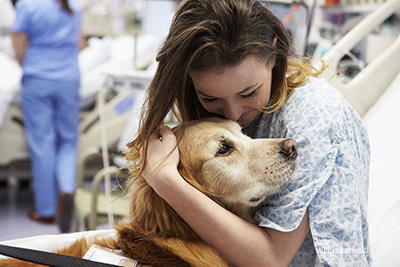 Dr. Ruth MacPete dedicates this blog to therapy dogs. For more from Dr. MacPete, find her on Facebook or at www.drruthpetvet.com!
Dr. Ruth MacPete dedicates this blog to therapy dogs. For more from Dr. MacPete, find her on Facebook or at www.drruthpetvet.com!
Animals have an incredible capacity to love and to heal. As pet parents, we know this firsthand. Whenever we are feeling down, our pets seem to instinctively know how to make us feel better. Science has only recently been able to provide the biological basis for these observations. Studies have found that petting a dog lowers blood pressure, causes the release of oxytocin, a hormone involved in emotional bond formation, and decreases levels of cortisol, a hormone associated with stress and anxiety.
Today I wanted to dedicate my blog to therapy dogs, those special dogs trained to bring love and comfort to people in hospitals, nursing homes, retirement homes, hospices, and disaster areas. Therapy dogs can be of any size or breed as long as they have a sound temperament. They need to be friendly, gentle, calm, and at ease in various settings. Therapy dogs must love being around people; after all, their job is to let strangers pet them, hug them, and even kiss them.
The use of therapy dogs is attributed to Elaine Smith, who founded Therapy Dogs International (TDI) in 1976 to train dogs to visit hospitals and other institutions. Her inspiration came from seeing how well patients responded to visits by a chaplain and his Golden retriever. She founded TDI to bring dogs and their innate ability to heal to patients and people in need. Since then, the use of therapy dogs has become more widely accepted.
Do you have a friendly pooch you think would make the perfect therapy dog? Are you wondering what it takes to be a therapy dog, or how you can sign your dog up? Besides liking people and having a suitable temperament, therapy dogs must meet stringent requirements in order to be a registered therapy dog.
Obedience test
Therapy dogs work in a variety of environments, including unfamiliar ones, and they are expected to remain calm and follow instructions at all times. In order to ensure that a therapy dog is well behaved, they must pass the AKC Good Citizen test (or its equivalent). Some institutions also test them to prove that they are not afraid of sudden noises or wheelchairs, walkers, and people with canes.
Health check
Therapy dogs need to be in good health. They need to be examined by a veterinarian and have a certificate of good health. They also need proof that they are up to date on the necessary vaccines. Finally, therapy dogs needs to have annual stool sample testing to be sure that they are free of internal parasites, and proof that they are on year round flea preventatives. Therapy dogs have to be healthy and free of parasites because they will be around children, patients, and the elderly.
Registration
Therapy dogs have to be officially registered. All required paperwork must be completed and submitted along with the required documents (i.e. Canine Good Citizen certificate, certificate of good health, proof of vaccinations) and a registration fee.
Therapy dogs capitalize on a dog’s incredible capacity to love and heal. If you think your dog has what it take to become a therapy dog and help others, contact the following to find out how your dog can make a difference in the lives of many. For more information about sharing your dog with people in need contact:
www.tdi-dog.org
www.therapydogs.com
The opinions and views expressed in this post are those of the author's and do not necessarily represent the beliefs, policies or positions of PetHealthNetwork.com, IDEXX Laboratories, Inc. or its affiliates and partner companies.
